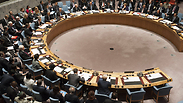
Israel's facing worsening international isolation, warns Foreign Ministry paper
Classified document lists possible consequences of diplomatic deterioration, including tighter economic and academic boycotts, restricted security imports and loss of US support.
Israel's worsening position on the world stage is expected to decline further in 2015, claims a Foreign Ministry report, which warns that more sanctions could be on the way.
The classified document, sent by the Foreign Ministry to Israeli missions worldwide, warns of possible diplomatic damage to Israel due to "moves to mark settlement products, stop the supply of replacement parts; debates on sanctions against Israel; demands for compensation for damage caused by Israel to European projects in the Palestinian territories; European activity in Area C, under Israeli rule; and more."
The significance of a worsening diplomatic situation is clear: European states will not only continue to advance diplomatic steps such as recognition of a Palestinian state, but will at the same time wok on an economic level to hurt the Israeli economy.
The classified document, penned by the Foreign Ministry's deputy director-general for coordination, Gilad Cohen, is a summary of an multi-ministry situation assessment conducted by Foreign Minister Avigdor Lieberman.
"We need to pay attention to internal processes in Europe and to possible consequences of the future of the European Union, as well as to trends of extremism and the rise of the radical right- and left-wings, the anticipated elections in Greece, and the elections in France in 2017 - all of which could put an end to the special ties with Israel," Cohen notes.
The document lists a series of economic sanctions and boycotts imposed as a result of the freeze in peace talks with the Palestinians, which are expected to seriously hurt Israel.
"The Europeans are creating a clear connection between diplomatic relations and economic ones (and) in this context, it is important to note that Europe is Israel's main trading partner," the document states.
This deterioration is reflected, among other things, "in independent French activity, including at the UN Security Council, and in the heightening of negative signals sent to Israel."
The threats the Foreign Ministry is preparing to deal with include an increase in the boycott of products from the settlements, mostly by Europe, and the branding of items produced in the settlements. This move could have implications for Israel's agricultural imports.
Another issue at stake is a decrease in security imports and supply of replacement parts to Israel - something that would primarily affect Israeli defense. In recent years, Britain, Belgium and Spain have all halted shipments of weapons to Israel, citing concerns that the arms would be used in violation of international law.
The European Union is also expected to demand compensation from Israel for damages it allegedly caused to projects in the West Bank and East Jerusalem. European aid organizations are running numerous Palestinian civilian projects and the Foreign Ministry is concerned that these organizations will now demand compensation if the projects are damaged due to IDF activity.
This is not the extent of the issue. In recent years, leading banks and investment and pension funds in Denmark, Norway, Ireland and the Netherlands have decided to halt cooperation with financial institutions in Israel that operate in the territories, and stop investing in Israel.
The Finance Ministry is concerned more financial institutions will follow suit and divert millions of dollars into alternative investments.
Israel's infrastructure is also at risk. After companies from Germany and the Netherlands withdrew from projects to lay rail tracks and construct of water and sewage treatment facilities in Israel, other companies could also drop future projects, hurting the planned upgrades of Israel's infrastructure.
The academic boycott against Israel could also escalate. Universities in Europe and the United States are expected to push for a halt in cooperation with Israeli academic institutes.
The classified document further warns that "American influence is successful, at present, in delaying practical decisions until after the elections in Israel. But in the wake of the systematic Palestinian policy to move the conflict to the UN arena, there's no guarantee the US will continue using its veto rights after elections."
The Foreign Ministry also addressed the volatile situation in the Middle East. "There are additional, significant, ongoing processes happening in the region, such as the armament of the terror organizations Hamas and Hezbollah, who are developing their abilities and improving them significantly.
"The terror organizations are working to improve their accuracy, as well as strengthening their abilities in unmanned aerial vehicles. Israel's handling of these threats is not unconnected to events in the Palestinian arena."
Regarding nuclear negotiations between world powers and Iran, the document states: "The Foreign Ministry is preparing for the possibility that negotiations will end in the first half of 2015 with a bad agreement, which Israel would be alone in opposing."











